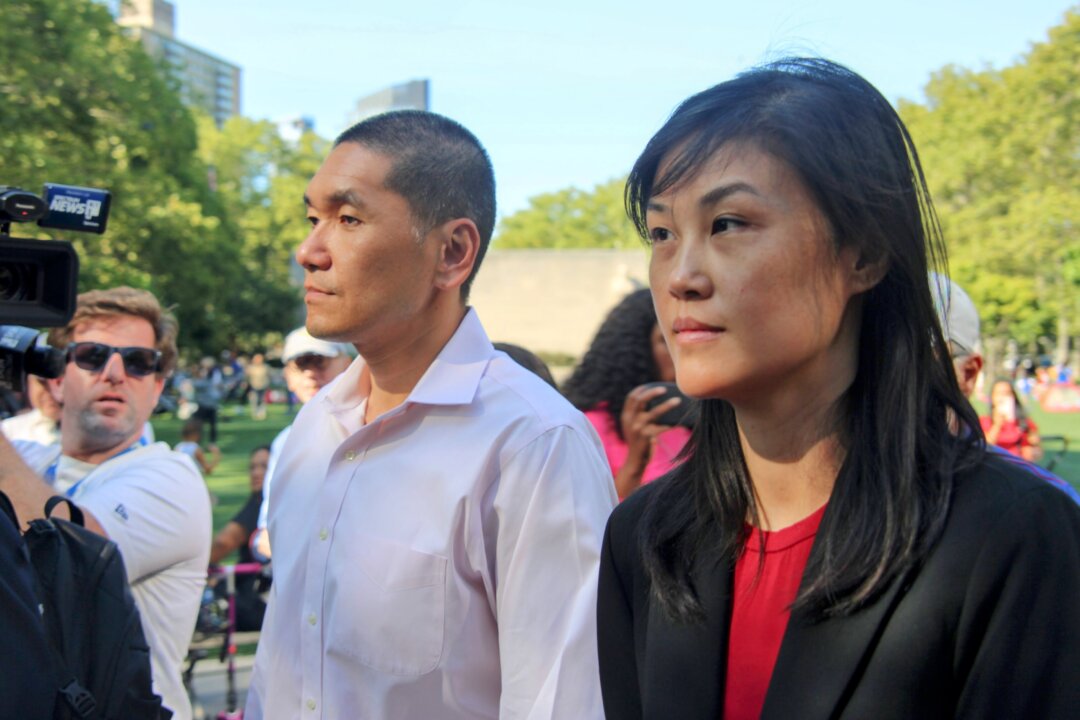Linda Sun, a former deputy chief of staff to New York Gov. Kathy Hochul, was charged with acting as a Chinese agent last year.
A Brooklyn federal judge has ruled against a motion to drop the charges against the New York governor’s former aide, who is accused of acting as an agent of the Chinese regime, saying prosecutors had presented sufficient allegations that she knowingly used her position to advance Beijing’s interests.
On May 5, U.S. District Judge Brian Cogan issued an order denying a motion to dismiss the superseding indictment against Linda Sun, a former deputy chief of staff to New York Gov. Kathy Hochul, and her husband, Chris Hu.
Sun, who also worked under former New York Gov. Andrew Cuomo, was initially charged in September last year with violating the Foreign Agents Registration Act (FARA), visa fraud, bringing in illegal immigrants, and conspiracy to commit money laundering. Hu was charged with conspiracy to commit money laundering, bank fraud, and misuse of means of identification.
The superseding indictment, which prosecutors filed in February, did not include new charges against Sun, but charged Hu with three new counts of money laundering.
Cogan dismissed the defendants’ argument that the superseding indictment “fails to state several essential elements of a FARA violation and fails to allege a FARA violation as a matter of law.”
The judge pointed to several incidents in the superseding indictment, including how Sun allegedly reminded a politician to publicly “thank the PRC government” for facilitating a donation of ventilators to the Greater New York Hospital Association in April 2020, at the request of a Chinese official.
Another incident, which took place in 2018, involved Sun being allegedly tasked by the Chinese Communist Party (CCP) with arranging for a delegation from central China’s Henan Province to the United States to meet another politician.
Cogan also cited allegations from the superseding indictment that Sun had used her position to exert influence. For instance, Sun allegedly bragged about her success at preventing the Taipei Economic and Cultural Office (TECO) from meeting with politicians in written communications.
Taiwan’s de facto embassy in the United States, the Taipei Economic and Cultural Representative Office (TECRO), oversees 12 TECOs, with 11 located in U.S. cities and one in Guam.
Sun allegedly also directed a politician’s staff to “decline a request for a meeting” between a Taiwanese mayor and the politician in February 2019, the judge said.
He pointed out that Sun knew “her purported conduct was unlawful under FARA,” contrary to her argument, given that the FBI had warned her about her activities.
The judge also didn’t throw out the charge of conspiracy to commit FARA against Sun, saying that the defendant conspired with two alleged Chinese agents by carrying out their requests. Additionally, Sun allegedly acted at the direction of four Chinese consulate officials.
Cogan stated that he agreed that the Chinese consulate officials couldn’t be charged with conspiracy to violate FARA. “But that does not mean they could not be considered unindicted co-conspirators with Sun,” he wrote.
Sun’s argument that prosecutors had stretched FARA to criminalize political activities by state officials was also dismissed by Cogan.
“If political and policy activities by state officials, with nothing more, was all that the superseding indictment sought to criminalize, this Court would agree,” the order reads.
“However, that is not what the superseding indictment charges,” it continues. “The superseding indictment charges Sun with acting as an agent for a foreign principal without registering with the Attorney General, as FARA requires.”
In the superseding indictment, prosecutors referenced several unlawful activities, including alleged bribery in the third degree under New York state law and a violation of FARA, to bring the money laundering charges against Sun and Hu.
Cogan said Sun’s argument contesting the bribery statute had “some common sense.” However, the judge explained that the statute “is broad enough to encompass money related to giving a bribe, in addition to receiving one.”
The judge dismissed Sun’s argument that the superseding indictment “does not link the alleged violation of FARA with any particular payment that could constitute proceeds under the money laundering statute.” Cogan pointed out that prosecutors had stated that Sun allegedly “received substantial economic and other benefits from representatives of the PRC government and the CCP,” including travel benefits, tickets to events, employment of Sun’s cousin in China, and facilitation of millions in transactions for Hu’s business activities in China.
Cogan also declined to dismiss charges against Hu, saying that he found “no arguments or independent basis” for the dismissal of charges against the defendant, even though he had joined Sun’s motion.
Sun’s lawyer, Jarrod Schaeffer, told The Epoch Times in an email that he was disappointed in the judge’s ruling, “but grateful for the Court’s careful consideration of the issues.”
“As the decision noted, dismissing an indictment is an extraordinary remedy that only occurs in extremely limited circumstances,” Schaeffer said. “But alleging the bare minimum necessary to proceed to trial—the argument that the government has made repeatedly in this case—says nothing about whether those allegations are true based on the evidence, and the Court’s decision rightly passed no judgment on whether the government will actually be able to prove what it has claimed. We remain confident in our client and believe that she will prevail at trial.”

